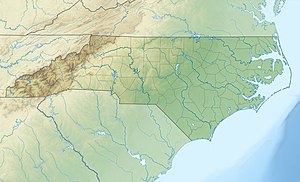Negro Creek is a 4.80 mi (7.72 km) long 2nd order tributary to Hyco Creek in Caswell County, North Carolina.
| Negro Creek Tributary to Hyco Creek | |
|---|---|
| Location | |
| Country | United States |
| State | North Carolina |
| County | Caswell Alamance |
| Physical characteristics | |
| Source | Stagg Creek divide |
| • location | about 2.5 miles southeast of Baynea, North Carolina |
| • coordinates | 36°14′20″N 079°16′55″W / 36.23889°N 79.28194°W[1] |
| • elevation | 732 ft (223 m)[2] |
| Mouth | Hyco Creek |
• location | about 2 miles south-southeast of Hightowers, North Carolina |
• coordinates | 36°18′15″N 079°14′17″W / 36.30417°N 79.23806°W[1] |
• elevation | 488 ft (149 m)[2] |
| Length | 4.80 mi (7.72 km)[3] |
| Basin size | 8.05 square miles (20.8 km2)[4] |
| Discharge | |
| • location | Hyco Creek |
| • average | 9.85 cu ft/s (0.279 m3/s) at mouth with Hyco Creek[4] |
| Basin features | |
| Progression | north-northeast |
| River system | Roanoke River |
| Tributaries | |
| • left | unnamed tributaries |
| • right | unnamed tributaries |
| Bridges | Old Collins Road, Gunn Poole Road, Hightower Road |
Course
editNegro Creek rises about 2.5 miles southeast of Baynea, North Carolina in Alamance County, and then flows northeasterly into Caswell County to join Hyco Creek about 2 miles south-southeast of Hightowers.[2]
Watershed
editNegro Creek drains 8.05 square miles (20.8 km2) of area, receives about 46.5 in/year of precipitation, has a topographic wetness index of 362.36, and is about 54% forested.[4]
References
edit- ^ a b "GNIS Detail – Negro Creek". geonames.usgs.gov. US Geological Survey. Retrieved 8 November 2020.
- ^ a b c "Get Maps". USGS Topoview. US Geological Survey. Retrieved 8 November 2020.
- ^ "ArcGIS Web Application". epa.maps.arcgis.com. US EPA. Retrieved 8 November 2020.
- ^ a b c "Negro Creek Watershed Report". US EPA Geoviewer. US EPA. Retrieved 8 November 2020.

